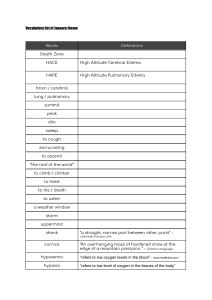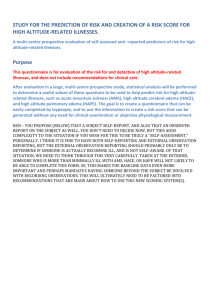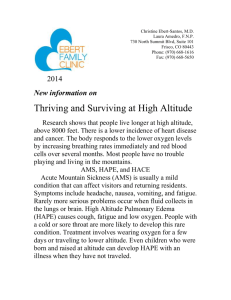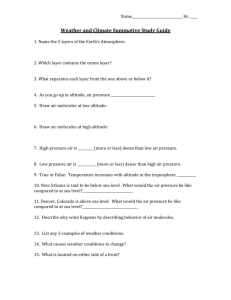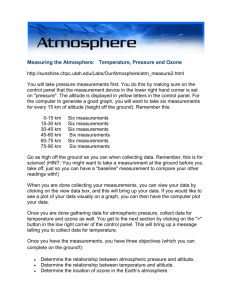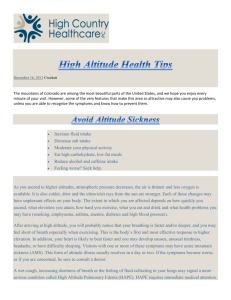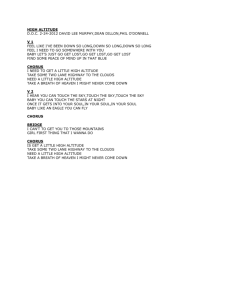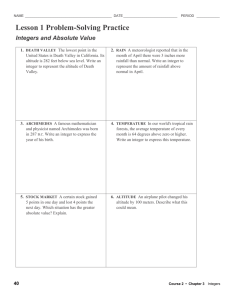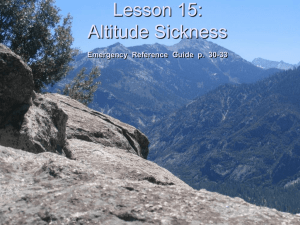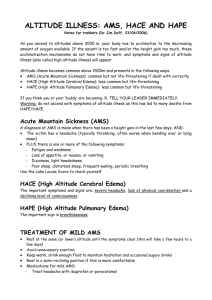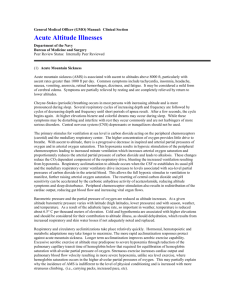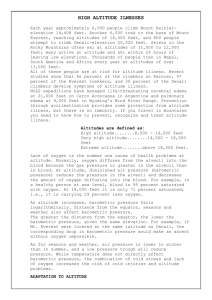risk_prediction_tool_v0.26
advertisement
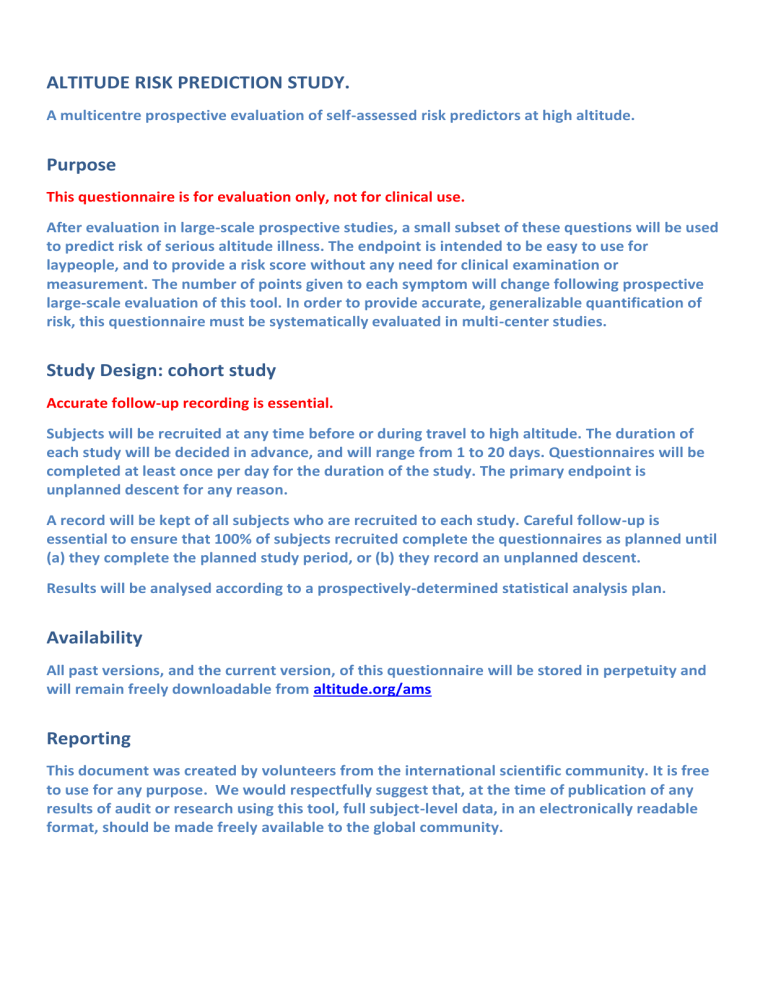
ALTITUDE RISK PREDICTION STUDY. A multicentre prospective evaluation of self-assessed risk predictors at high altitude. Purpose This questionnaire is for evaluation only, not for clinical use. After evaluation in large-scale prospective studies, a small subset of these questions will be used to predict risk of serious altitude illness. The endpoint is intended to be easy to use for laypeople, and to provide a risk score without any need for clinical examination or measurement. The number of points given to each symptom will change following prospective large-scale evaluation of this tool. In order to provide accurate, generalizable quantification of risk, this questionnaire must be systematically evaluated in multi-center studies. Study Design: cohort study Accurate follow-up recording is essential. Subjects will be recruited at any time before or during travel to high altitude. The duration of each study will be decided in advance, and will range from 1 to 20 days. Questionnaires will be completed at least once per day for the duration of the study. The primary endpoint is unplanned descent for any reason. A record will be kept of all subjects who are recruited to each study. Careful follow-up is essential to ensure that 100% of subjects recruited complete the questionnaires as planned until (a) they complete the planned study period, or (b) they record an unplanned descent. Results will be analysed according to a prospectively-determined statistical analysis plan. Availability All past versions, and the current version, of this questionnaire will be stored in perpetuity and will remain freely downloadable from altitude.org/ams Reporting This document was created by volunteers from the international scientific community. It is free to use for any purpose. We would respectfully suggest that, at the time of publication of any results of audit or research using this tool, full subject-level data, in an electronically readable format, should be made freely available to the global community. DAILY SYMPTOM RECORD Altitude sickness risk score (ASRS) v0.26 FOR EVALUATION ONLY Please circle one statement in each row that most closely applies to you. SELFASSESSMENT 0 1 Wellness Headache (severity) Name/identifier: Date: Time: 2 3 I feel well I feel moderately unwell I feel very unwell I feel worse than at any other time in my life None or mild Moderate headache Severe headache The worst headache I can imagine Mainly at the side/sides of my head Mainly at the back of my head All over my head None or mild (not feeling nauseated) Moderate nausea Severe nausea Worst nausea I have ever had No vomiting in last 24h I have vomited once in the last 24h I have vomited 2-3 times in last 24h I have vomited 4 or more times in last 24h Good night’s sleep Slightly disturbed sleep Moderately disturbed sleep Terrible night’s sleep Not exhausted Slightly exhausted Very exhausted Completely exhausted Cough No cough Any cough Moderate cough Severe cough Cough (type) No cough Dry cough (not coughing anything up) Coughing up sputum Coughing up blood Comparison with others I feel better than most About average I feel worse than most I feel worse than everyone else If you have a Mainly at the headache, where front of my head is it worst? Nausea (the sensation of needing to vomit) Vomiting Sleep Exhaustion Unsteadiness Breathlessness None Slightly Very unsteady unsteady on feet on feet Unable to stand without help None or only on substantial exertion Breathless Breathless walking slowly walking slowly uphill on flat surface Breathless at rest SCORE Total score: Altitude sickness risk score (ASRS) FOR EVALUATION ONLY Please ask any other person to complete this questionnaire regarding your performance. DAILY EXTERNAL ASSESSMENT 0 1 2 Comparison with others He/she is doing better than most His/her performance is about average He/she is doing worse than most Breathing He/she appears out of He/she appears to be out of breath only when breath when walking on a walking/climbing flat surface uphill He/she appears to be out of breath at rest Unsteadiness He/she is completely steady He/she seems to be a little unsteady when standing or walking He/she seems to be quite unsteady when standing or walking SCORE Total score: BASELINE INFORMATION Past history HACE No previous history of high altitude cerebral edema (HACE), or don’t know I believe I have previously had high altitude cerebral edema (HACE) Past history HAPE No previous history of high altitude pulmonary edema (HAPE) I believe I have previously had high altitude pulnonary edema (HAPE) Speed of ascent in last 3 days Less than 1000m < 3280feet Any nose or chest infection in last 7 days None Recent nose/chest infection (eg. cough/cold/ vomiting) Female Male Sex More than 1000m > 3280feet More than 2000m > 6560feet Physical fitness (normally at home) I’m normally quite I’m normally about average unfit for my age group for people my age I’m normally fitter than most people my age Other illnesses Any other illness for which I currently have a prescription from a doctor (eg. inhalers, tablets) I have another illness that normally limits my ability to exercise No other illnesses Please record your outcomes for today: TICK BOX OUTCOME ASSESSMENT - TODAY CONTINUING AS PLANNED: CHANGING PLANS: UNPLANNED DESCENT FOR ANY REASON: IF UNPLANNED DESCENT OR CHANGE OF PLANS, PLEASE SPECIFY REASON: SUSPECTED HIGH ALTITUDE CEREBRAL EDEMA (HACE) SUSPECTED HIGH ALTITUDE PULMONARY EDEMA (HAPE) SUSCPECTED ACUTE MOUNTAIN SICKNESS ACCIDENT OR INJURY OTHER REASON (please describe in free text): TICK BOX
